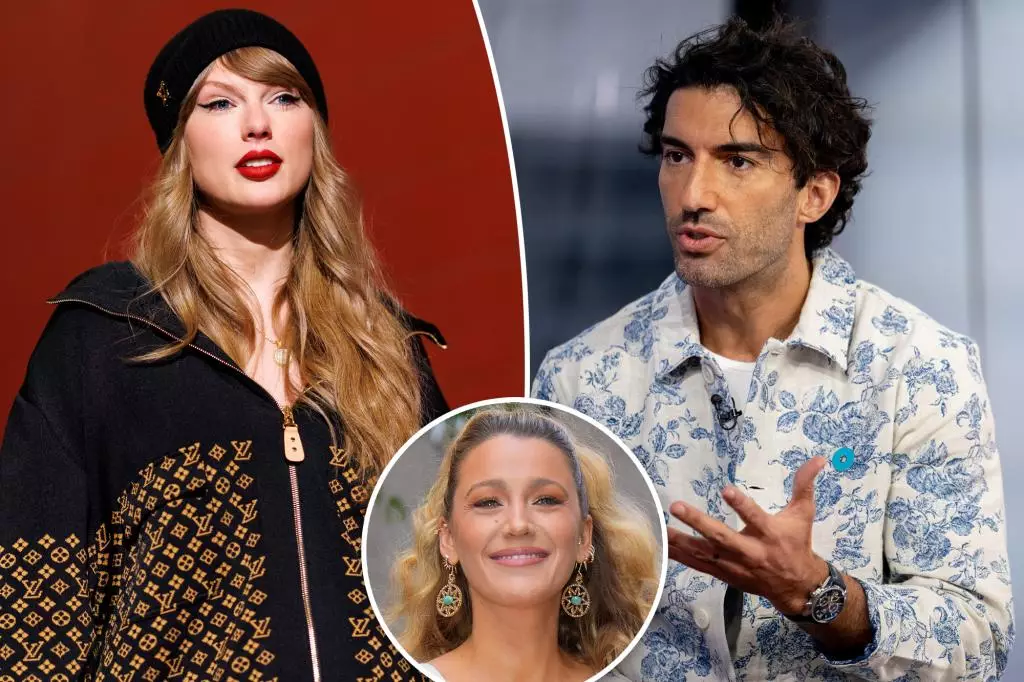The recent legal clash involving Justin Baldoni, Blake Lively, and the megastar Taylor Swift has brought a refreshing yet alarming scrutiny on how public figures navigate their grievances. Rather than being a mere footnote in celebrity gossip, this saga underscores a larger issue at play: the intersection of power dynamics in the entertainment industry and the inadvertent fallout on unsuspecting parties, in this case, Swift, who found herself summoned to court amidst a tempest.
The Unexpected Target
Baldoni and his legal representation initially opened an odd chapter by including Swift in their legal complaints. According to reports, they believed that the “Shake It Off” singer was entangled in matters concerning Lively’s alleged efforts to exert influence over the film adaptation of “It Ends With Us.” In executing subpoenas against Swift, it seems they thought they could uncover critical information. However, the attorney for Lively, Bryan Freedman, implying Swift’s alleged involvement in creative disputes related to the film, inadvertently raised eyebrows. Swift, an artist of substantial global influence, became an unwitting pawn in a multifaceted scandal that many agree should never have involved her.
The Legal Turnaround
What transpired soon after reveals a drastic shift in the narrative. Reports confirmed that Baldoni’s team withdrew the subpoena, citing that they had garnered the requisite information without further legal pressure. Lively’s representative expressed relief, describing the subpoenas as “harassing.” This raises an essential question: why impose such pressure on a public figure known for inspiring millions if those details were attainable through normal channels? It reflects an unsettling trend where legal intimidation is used as a weapon in professional squabbles, ultimately damaging the reputations of those who are simply being entangled in a web of celebrity politics.
The Role of Celebrity Influence
A significant point of contention emerged when Baldoni’s attorney suggested that Lively leveraged her close relationship with Swift. The implication here is as powerful as it is troubling: that friendship can morph into a tool for manipulation in Hollywood’s high-stakes environment. However, an equally compelling rebuttal came from Lively’s camp, who asserted that the allegations were not only baseless but cowardly.
In an era where friendships can become transactional, the moral implications of such claims are staggering. Swift’s representation emphasized that their client was minimally involved, effectively maintaining her narrative that she had no role in the film’s direction or production—an assertion supported by her busy schedule during filming. This aspect brings a much-needed examination of celebrity responsibility in discourse. Are they simply complicit in the games others play, or do they have a moral obligation to distance themselves from potential legal calamities?
Implications for the Legal System and Beyond
What this unfolding situation highlights is the propensity for the legal system to become a battleground for personal grievances in the entertainment world. The case suggests a troubling dynamic wherein prominent figures wield their influence to corner less dominant players in the industry, potentially setting dangerous precedents. Such power imbalances can discourage individuals from speaking up or distancing themselves from controversial matters for fear of being dragged into unwarranted disputes.
Furthermore, the withdrawal of the subpoena may not signify voluntariness but could also pose critical insights into the legal strategies adopted by high-profile lawyers. Did Baldoni’s team fold under pressure once they understood the public relations disaster that would befall them had they continued? The optics of targeting a beloved artist like Swift, only to backtrack, opens the floodgates for discussions about integrity in legal practices.
As the dust settles on this peculiar narrative, we are left to ponder what really lies beneath the surface of celebrity culture. Are we merely spectators to a series of escalating dramas, or are there deeper implications for how legal frameworks interact with the world of influencer relationships? The fallout from Baldoni’s legal maneuvers against Swift ultimately serves as a cautionary tale about the perils that come when personal conflicts go nuclear, and innocent parties are thrust into the eye of the storm.

